| "Do you see how windy it is out there?"
asked my wife as I prepared to throw off the dock
lines. Yes, I had seen the white caps marching across
Pamlico Sound and that is exactly why I was going
sailing. I had launched my John Welsford-designed
Pathfinder
"Spartina" earlier in the summer and it
looked like I had finally found a chance to sail the
yawl under jib and mizzen in a nice little squall.
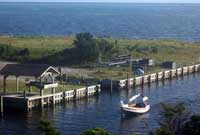 |
We were on our
annual vacation down in Ocracoke Island, N.C.,
one of the more remote spots on the Outer Banks. |
We were on our annual vacation down in Ocracoke Island,
N.C., one of the more remote spots on the Outer Banks.
We had been visiting the island for over a decade,
staying at a nice little house on a canal leading
to the sound. Two kids, four bikes, boogie boards,
some nice bottles of wine and a stack of books. It
was a family vacation, not a sailing trip. But I did
get to spend plenty of time out on the water.
| Ocracoke is a quiet,
isolated island reachable only by ferry.
We came from our Chesapeake, Va. home by way of
the Outer Banks towns of Nags Head, Kill Devil
Hills and Kitty Hawk, then taking the Bonner Bridge
over to Hatteras Island. |
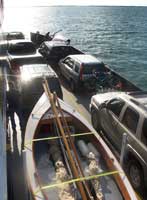
|
Ocracoke is mostly known for the pirate Blackbeard
and 13 miles white, sandy beaches. A 1823 lighthouse
looks out over Silver Lake Harbor and the surrounding
village. Once a working waterfront for commercial
crabbers and fishermen, it is now a vacation spot
with a handful of hotels and more than a hundred "cottages"
for rent. It is a quiet, isolated island reachable
only by ferry. We came from our Chesapeake, Va. home
by way of the Outer Banks towns of Nags Head, Kill
Devil Hills and Kitty Hawk, then taking the Bonner
Bridge over to Hatteras Island. At the southern end
of Hatteras we caught the free 40 minute ferry ride
to Ocracoke. From the ferry docks it is about 12 more
miles to the village at the southern end of the island.
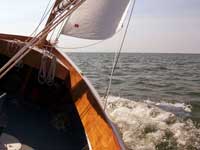 |
Eventually the
rain moved on and the breeze slackened. I raised
the main with a single reef in place and continued
sailing. |
It was midweek when I spotted the white caps out
on the sound. I motored down the canal and out in
to Pamlico Sound, raised the mizzen and then the jib.
And I was off sailing, perfectly under control. It
was shallow water in that spot so I raised the cb
a bit and still sailed to the windward very nicely.
After about 20 minutes the rain came. No lightening
or thunder, so why worry about it? I tacked back and
forth in to the stiff wind, working between Ocracoke
to the east and Howard's Reef, marked by a line of
crab pot markers, to the west. Into the wind, or downwind,
I felt very pleasantly in control. Eventually the
rain moved on and the breeze slackened. I raised the
main with a single reef in place and continued sailing.
It was a real treat to the out there.
| In the harbor I
tacked back and forth under the old lighthouse,
watching the watermen and fishing guides head
out for a day on the water. |
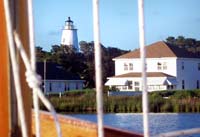
|
For most days of the vacation I was heading down
the canal before dawn, raising sails as the sun crept
up behind the cloud banks to the east. I would get
in a two or three hour sail before the rest of the
family was up and running (it was vacation for them
after all). One morning I sailed out to a spoil island
a few miles out in to the sound. I cut a good mile
off the trip a by raising my cb and sneaking over
a shoal in to the deep, well marked channel leading
past the island. As I got closer I found I was tacking
in to both the wind and the current, a nice little
challenge for an early morning sail. Eventually reaching
the island I heard the protests of screeching birds
that used the spot as a rookery. I came about, cruised
back down the channel, and jump over the shoal and
sailed back to our house. Other mornings I would sail
around to Silver Lake harbor. The entrance there is
narrow, with rock jetties on either side. I found
I struggled a bit getting in to the harbor as a copse
of trees blocked the wind at the narrowest point.
I think I could have made it in under sail eventually,
but since I had to share the narrow channel with the
large car ferries I opted to crank up the outboard
and get in to harbor as quickly as possible. In the
harbor I tacked back and forth under the old lighthouse,
watching the watermen and fishing guides head out
for a day on the water.
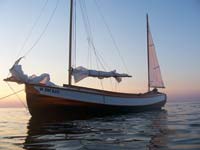 |
I put Spartina
through the paces, tacking and jibing; learning
how to sail with a mizzen. |
After a morning with the family at the beach the
wife and daughters would take an afternoon walk in
to the village for some ice cream. I would head out
on the boat once again. The winds usually seemed strongest
mid-afternoon. I would put Spartina through the paces;
tacking and jibing, learning how to sail with a mizzen.
Much of the time I sailed with the cb partially raised,
and found that she sailed very well. A few times I
did find the bottom with the 100 lb steel plate cb.
A "shooshing" noise would tell me that the
cb was nosing its way in to sand and mud bottom. A
quick turn on the winch raised the board a few inches
and on I went.
| After dinner it
was time for a family time. A short sail followed
by anchoring and then a sunset swim was just right
for everybody. |
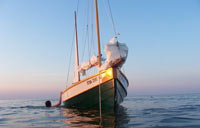
|
After dinner it was time for a family time. A short
sail followed by anchoring and then a sunset swim
was just right for everybody. The sunsets were spectacular,
and off in the distant we would see the "pirate"
charter schooner Windfall taking that evening's passengers
out on for a sail.
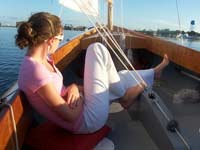 |
I can't say
enough good things about sailing down off of
Ocracoke. Plenty of wind and lots of sunshine,
perfect for a small boat. |
I can't say enough good things about sailing down
off of Ocracoke. Plenty of wind and lots of sunshine,
perfect for a small boat. The issue for larger boats
is the skinny water, but with a centerboard and shallow
draft, plus a little common sense, it is not a problem.
I hope to be back down there for some more sailing,
maybe with a boom tent and plans for some extended
cruising.
| The Pathfinder
is solid, spacious and easy to handle. I feel
very comfortable sailing her by myself, but I've
also sailed with four people on board and found
her to be very comfortable. |
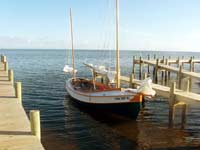
|
I also can't say enough good things about the Pathfinder
design. I spent about 18 months building my Spartina,
she replaced a Devlin designed Nancy's China that
my Dad and I had built almost 20 years ago. I'm not
a woodworker by any means; skills were picked up on
the job. Spartina has a work-boat finish, nothing
fancy there. But the hull is true to John's design,
and very solid. That was the goal for the boat. The
Pathfinder is solid, spacious and easy to handle.
I feel very comfortable sailing her by myself, but
I've also sailed with four people on board and found
her to be very comfortable. I'm still learning to
use the mizzen, but it makes more and more sense as
I go along. Plenty of dry storage and positive flotation
add the secure feeling of the design. The gaff-rigged
yawl, with bird's mouth masts and spar that my Dad
and I made, draw the attention of a lot of folks out
on the water.
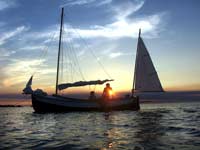 |
The gaff-rigged
yawl, with bird's mouth masts and spar that
my Dad and I made, draw the attention of a lot
of folks out on the water. |
I believe the safety and comfort of Spartina will
expand my sailing horizons. The sounds of North Carolina,
the Chesapeake Bay, maybe even the coast of the Gulf
of Mexico. I can't wait to find out where this boat
will take me.

More about Pathfinder

|